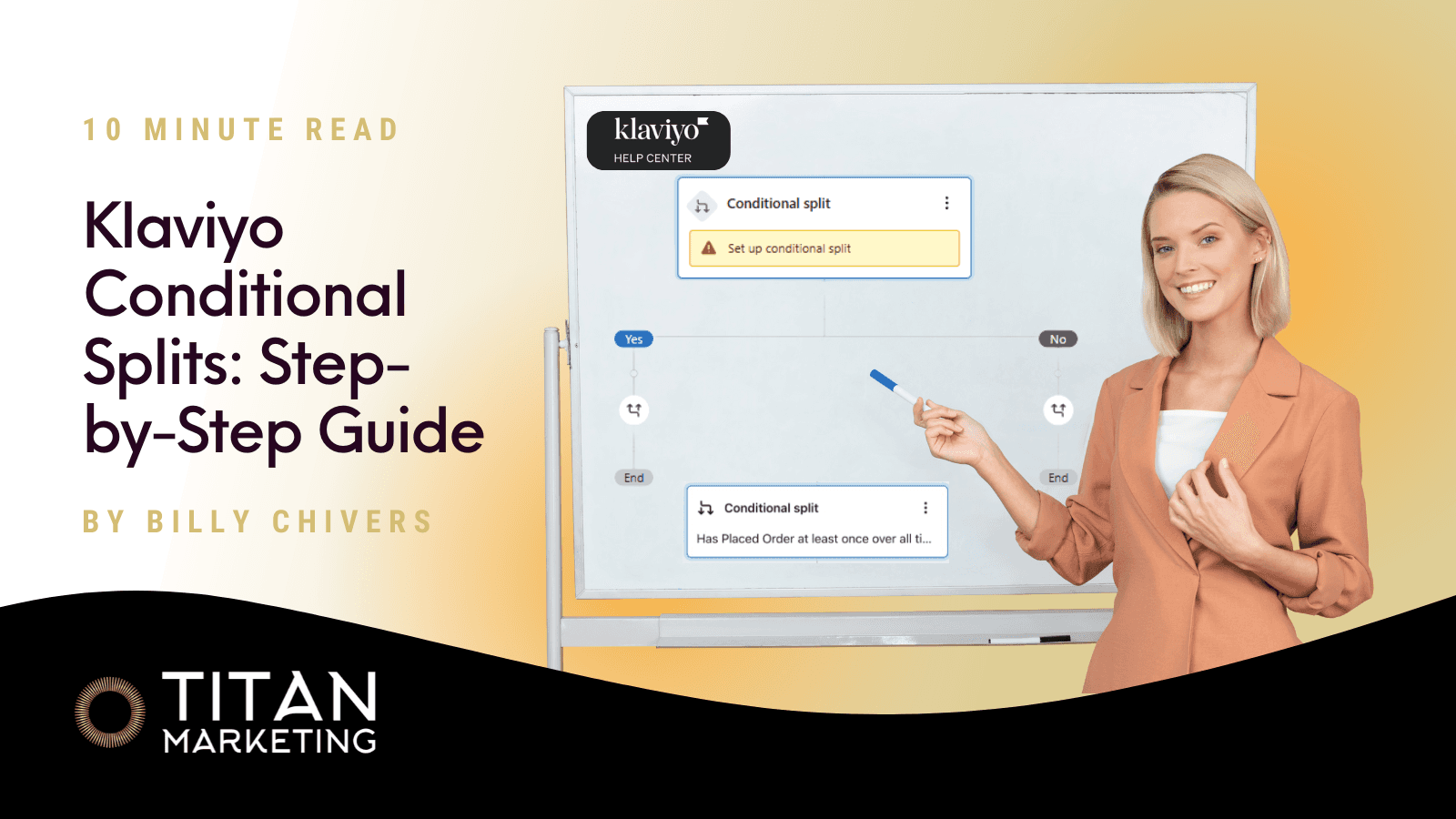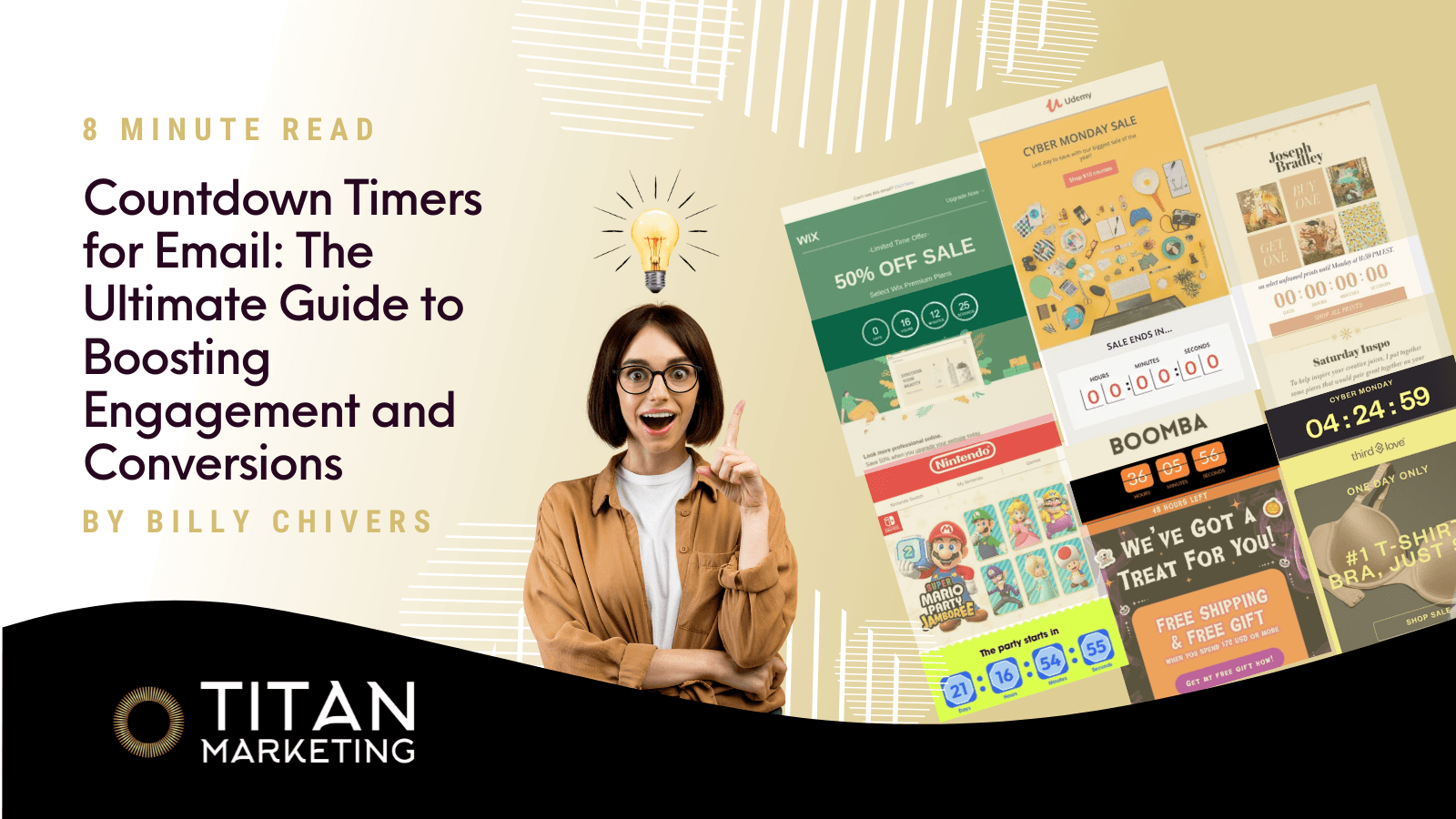
Blog
January 23, 2025
Countdown Timers for Email: The Ultimate Guide to Boosting Engagement and Conversions

Blog
January 23, 2025
Countdown Timers for Email: The Ultimate Guide to Boosting Engagement and Conversions

Blog
January 23, 2025
Countdown Timers for Email: The Ultimate Guide to Boosting Engagement and Conversions
Learn how countdown timers for email boost engagement and conversions with our ultimate guide. Explore their benefits, use cases, and step-by-step implementation.
Countdown timers are a simple yet powerful tool in email marketing. By creating a sense of urgency, they drive engagement and conversions like no other element.
Whether you’re promoting a flash sale, launching a product, or reminding customers of an upcoming event, countdown timers can help you achieve your goals.
This guide will walk you through everything you need to know about countdown timers, from understanding their purpose to implementing them effectively in your campaigns.
Section 1: What Are Countdown Timers for Emails?
Definition and Importance of Countdown Timers
Countdown timers are dynamic visuals embedded in emails that tick down to a specific event or deadline, creating urgency and encouraging immediate action.
Why They Matter:
Create Urgency: Motivate recipients to act before a deadline.
Encourage Quick Action: Nudge users to make purchases or sign up promptly.
Enhance Visual Appeal: Dynamic timers grab attention and add professionalism.
Key Benefits of Using Countdown Timers in Emails:
Boost Engagement: Leverage FOMO to prompt action.
Increase Conversions: Visible deadlines reduce procrastination.
Improve Aesthetics: Make emails more engaging and memorable.
Section 2: Why Do Countdown Timers Work?
The Psychology Behind Countdown Timers
Countdown timers are not just eye-catching elements; they are rooted in proven psychological principles that drive human behaviour. They work by leveraging two powerful concepts: urgency and scarcity. Urgency and Scarcity
Urgency is the pressure to act quickly before a deadline. It stems from the fear of missing out (FOMO) on a great deal or event. When customers see a ticking timer, they feel compelled to act faster, knowing the opportunity won’t last forever.
Scarcity focuses on limited availability, such as exclusive deals or limited stock. Combining this with a countdown timer creates an even greater sense of pressure to act immediately before the chance is gone.
The Power of Visual Cues
Countdown timers grab attention by visually reinforcing deadlines. Unlike static text, a ticking timer stands out and constantly reminds recipients of the time left to act. Since the brain processes visuals faster than text, timers are highly effective at highlighting key messages in an email.
Section 3: Use Cases for Countdown Timers in Email Campaigns
Campaign Types That Benefit from Countdown Timers
Here are some specific campaign types that benefit significantly from the use of countdown timers:
Flash Sales and Limited-Time Discounts
Countdown timers are perfect for creating excitement and urgency during flash sales or limited-time discounts. By emphasizing the short time frame, they compel customers to act quickly before the offer expires.
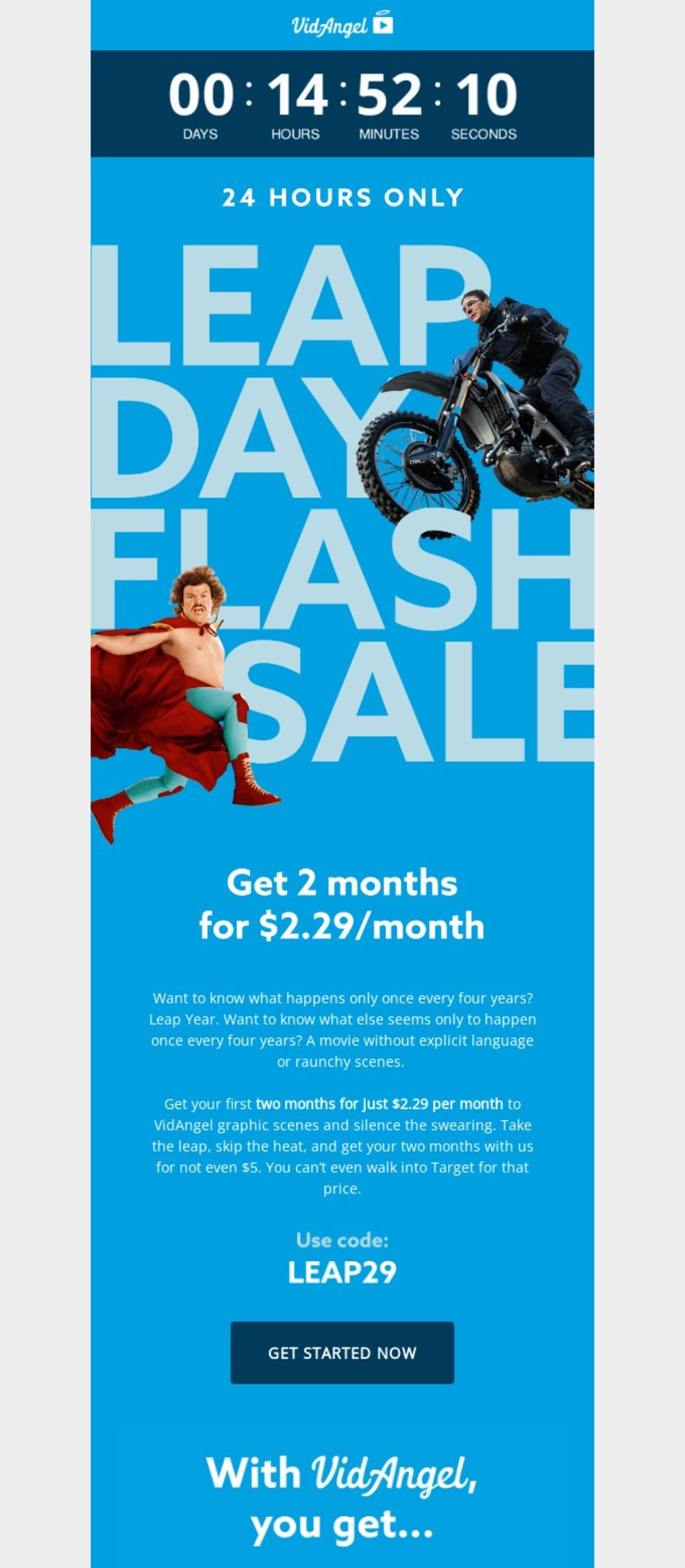
Event Reminders
For events like webinars, product launches, or special promotions, countdown timers act as a strong motivator to register or participate before it’s too late.
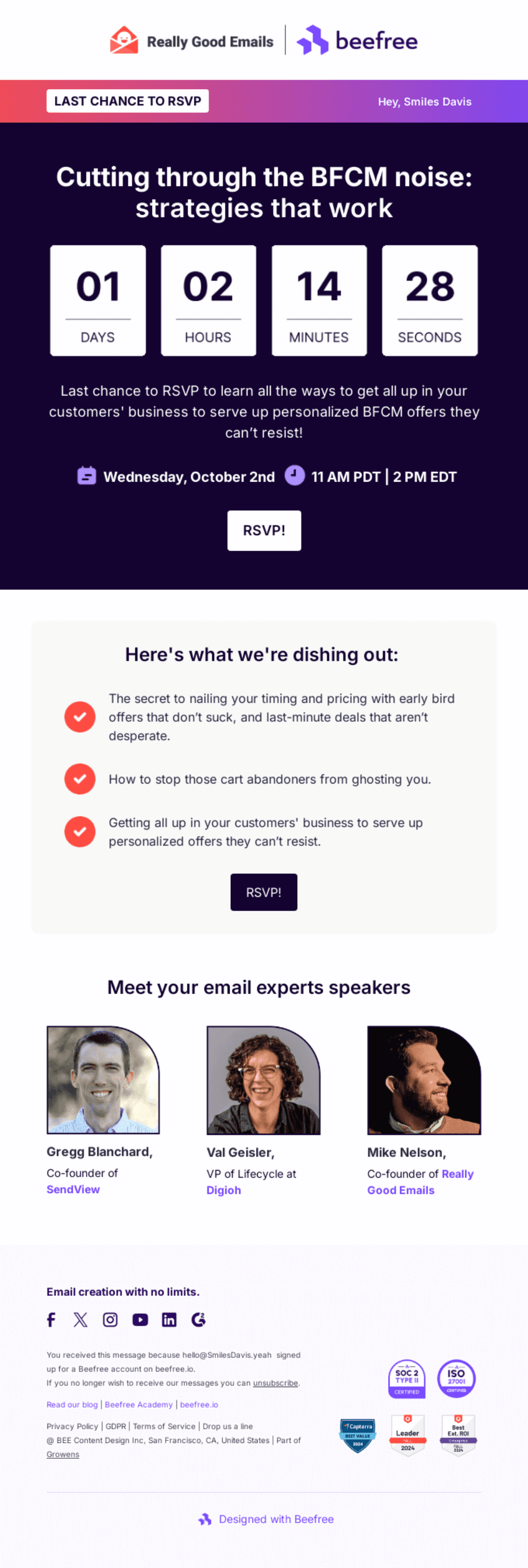
Product Launch Countdowns
Build excitement and anticipation for a new product launch by incorporating countdown timers into your emails. They create buzz and make the launch feel like a major event.

Seasonal Campaigns
Seasonal sales like Black Friday, Cyber Monday, or holiday promotions gain an extra boost with countdown timers. Imagine using them in a Black Friday campaign to emphasize limited-time deals. Enhance your campaign strategy with insights from our BFCM Ultimate Guide.
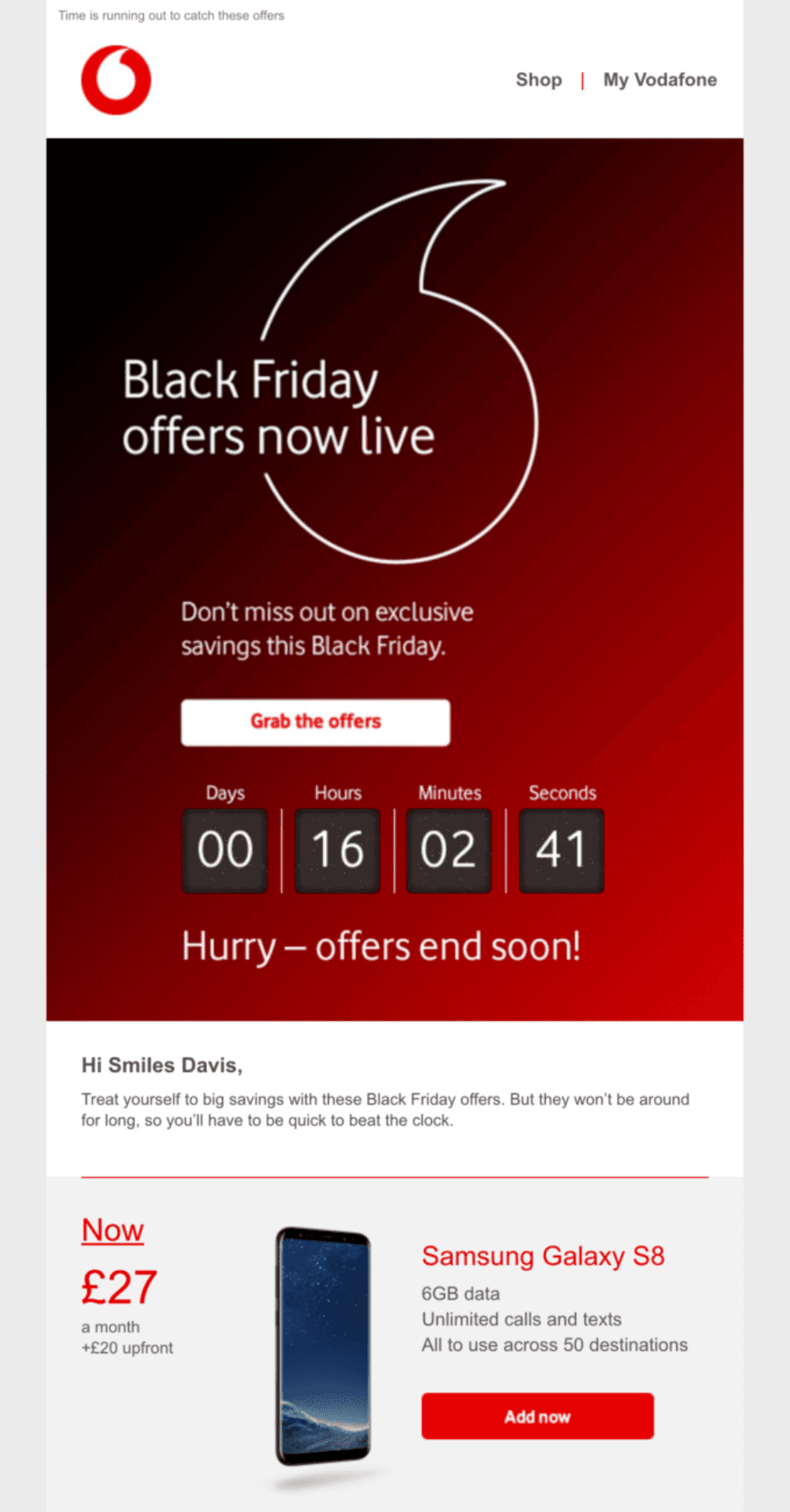
Source (All Examples): Really Good Emails
Section 4: Step-by-Step Guide to Creating Countdown Timers
Step 1: Choose a Countdown Timer Tool
Selecting the right tool is the first step to creating an effective countdown timer. Here are some recommended tools with their pros and cons to help you make an informed choice:
CountdownMail
A free and user-friendly tool designed for simplicity.
Pros: Quick and easy setup with customisation options for colours and fonts.
Cons: Offers fewer advanced features, such as timezone-specific timers or dynamic updates.
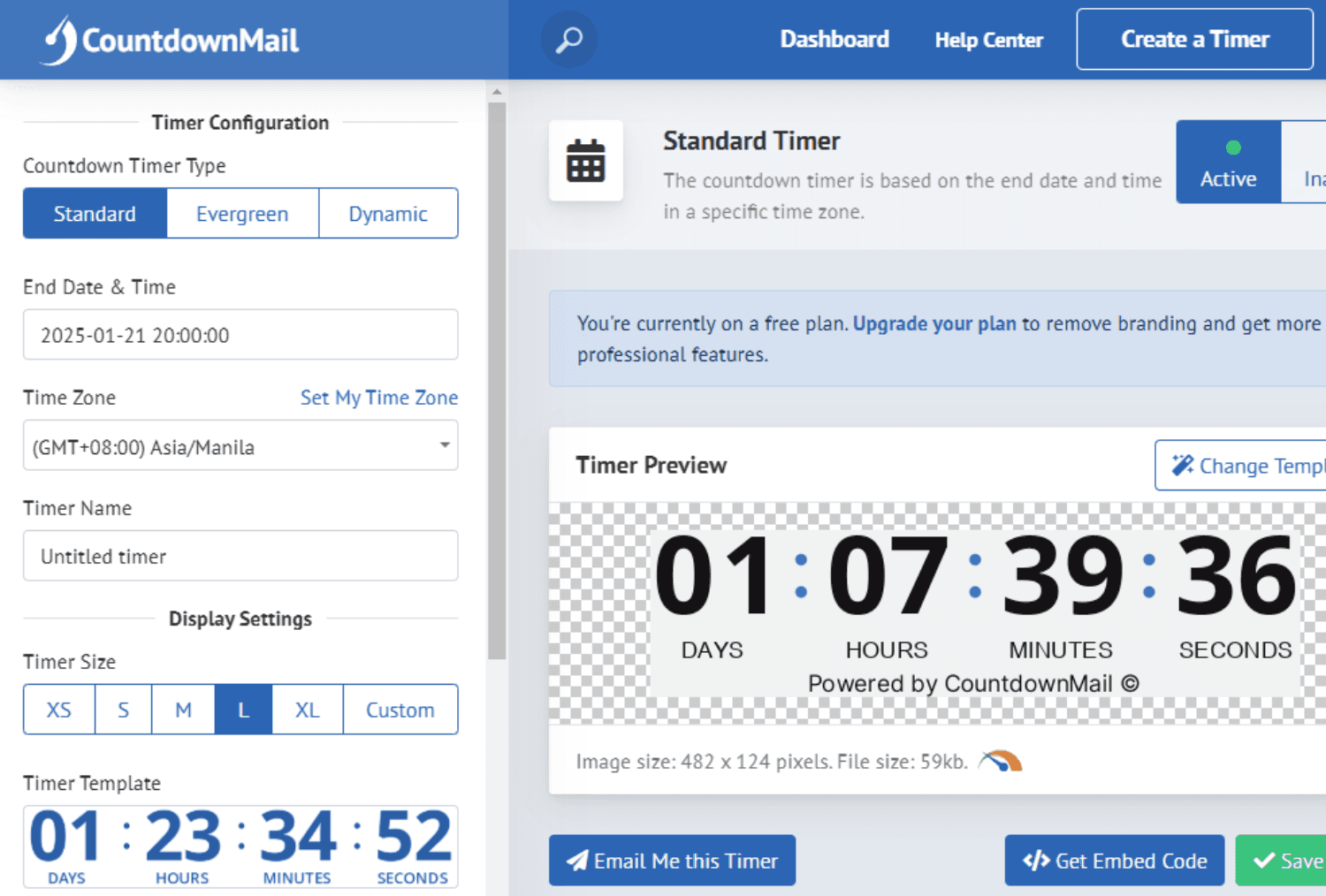
Source: CountdownMail
Sendtric
A straightforward tool for generating timers.
Pros: No signup required, making it ideal for quick, one-time use.
Cons: Limited design options and less flexibility compared to paid tools.
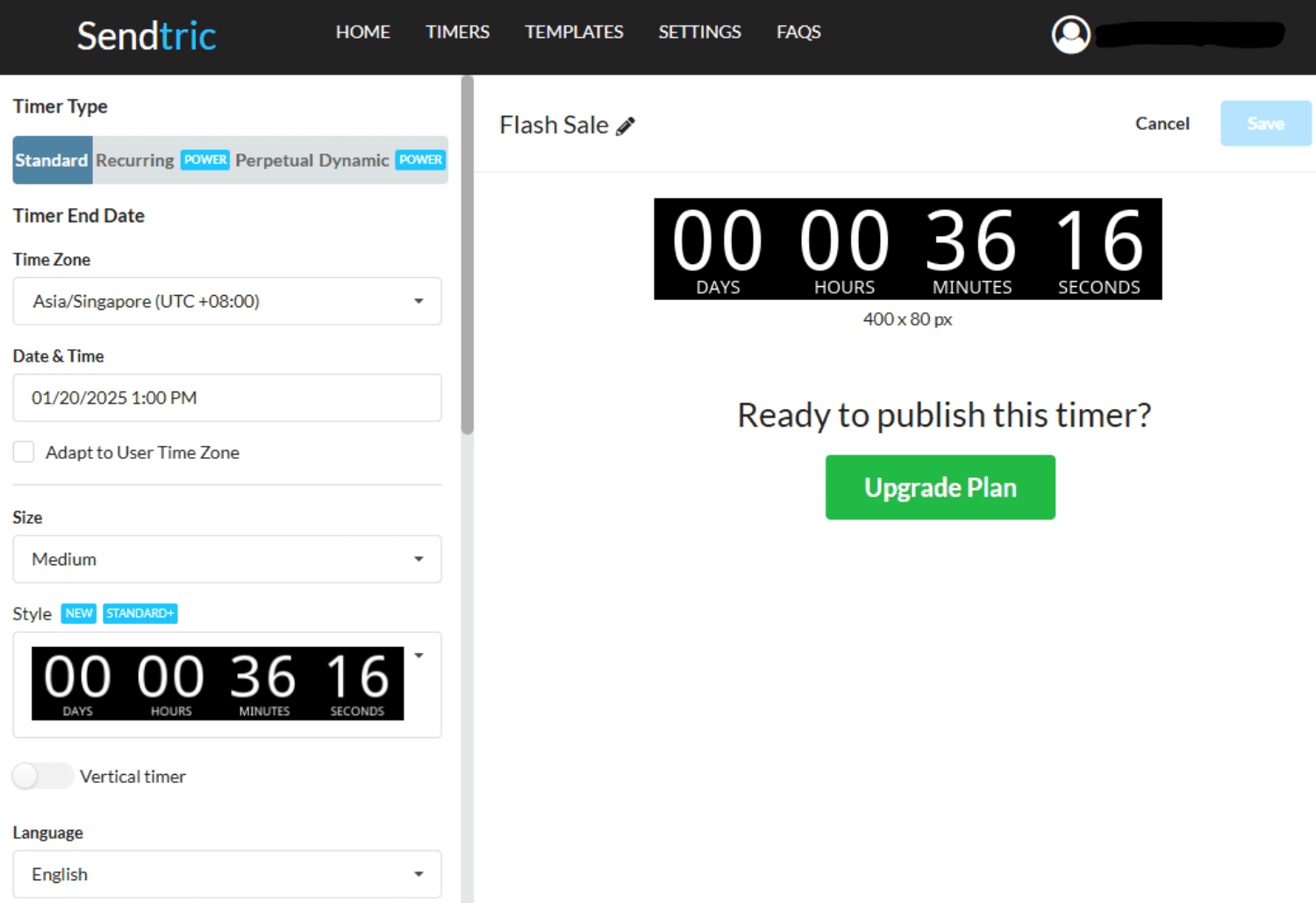
Source: Sendtric
MailTimers
A robust tool designed for businesses that need advanced features.
Pros: Includes advanced options such as timezone adjustments, dynamic updates, and stylish templates.
Cons: Requires a paid subscription to unlock full functionality.
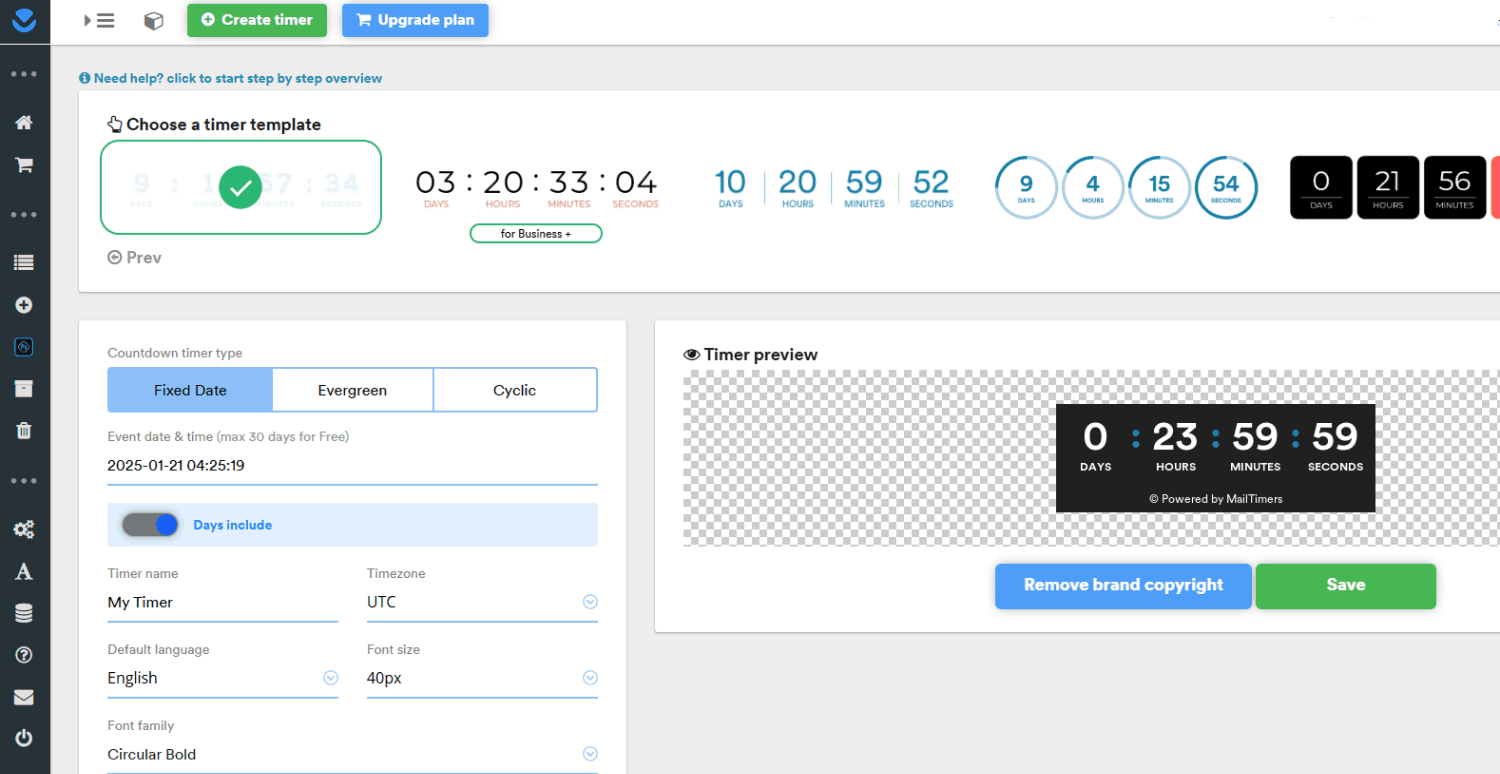
Source: MailTimers
Step 2: Customise Your Timer
Once you’ve chosen a tool, the next step is to customise your countdown timer to align with your brand and campaign goals.
Options to Customise:
Adjust colours, fonts, sizes, and styles to match your brand identity.
Ensure the timer is visually appealing and fits seamlessly into your email design.
Advanced Features to Explore:
Timezone Adjustments: Set timers to adapt to the recipient’s local timezone, ensuring relevance for global audiences.
Real-Time Updates: Ensure the timer dynamically updates to reflect the correct countdown, even when the email is opened multiple times.
Step 3: Generate and Embed the Timer Code
Embedding timers into your email flows is straightforward but even more impactful when paired with advanced email tools. For example, Klaviyo Predictive Analytics can complement timers by targeting high-intent customers.
Klaviyo: Open the email editor, paste the generated HTML code directly into a custom block, and adjust the placement for optimal visibility.
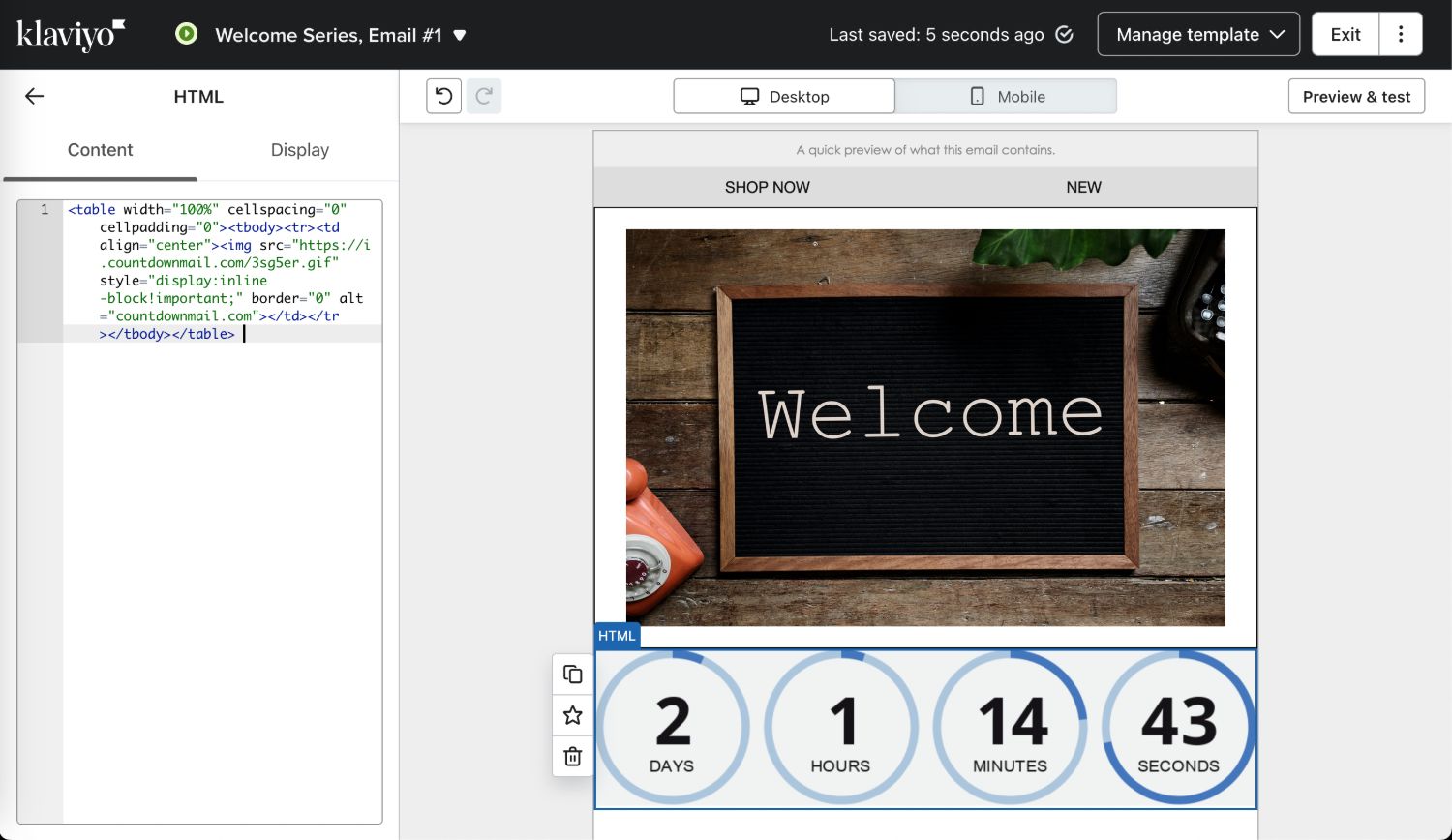
Source: CountdownMail
Mailchimp: Use the HTML block in the email editor to paste the timer code. Drag and drop the block into your desired email section.
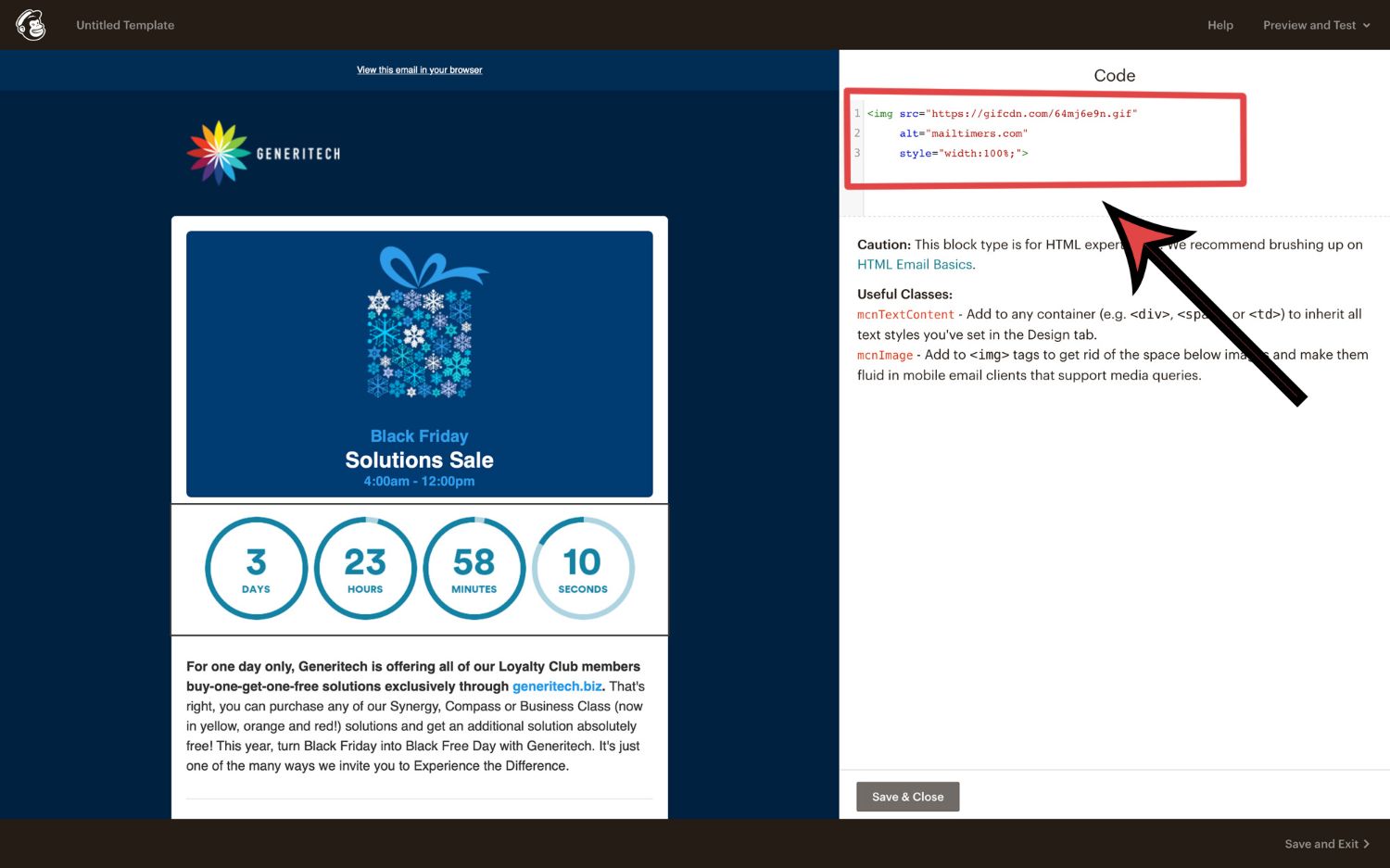
Source: Mailtimers
If you're evaluating options, our comprehensive comparison of Klaviyo vs Mailchimp provides valuable insights to help you decide.
Section 5: 10 Examples of Countdown Timers from DTC Brands
1. PrettyLittleThing

Why It Works:
Bold colours and a countdown timer amplify urgency for this flash sale. Highlighting multiple discount categories encourages exploration across products.
2. L'AMARUE

Why It Works:
The countdown timer reinforces urgency, clearly showing the limited time left for the sale, while the "Last Hours" headline grabs attention immediately. The inclusion of an additional incentive (free gift with purchase) further encourages immediate action, and the well-organised categories make navigation and decision-making seamless.
3. Max Mara

Why It Works:
The countdown timer builds anticipation for an exclusive fashion event, creating a sense of urgency and excitement. The clean, minimalist design aligns with the brand's elegance, while the "Add to My Calendar" CTA makes it easy for recipients to engage and not miss the event.
4. Kinfield

Why It Works:
A clear "Ends Tonight!" message drives urgency, while the free mini product adds extra value. The direct CTA and countdown reinforce immediate action.
5. 4Knines
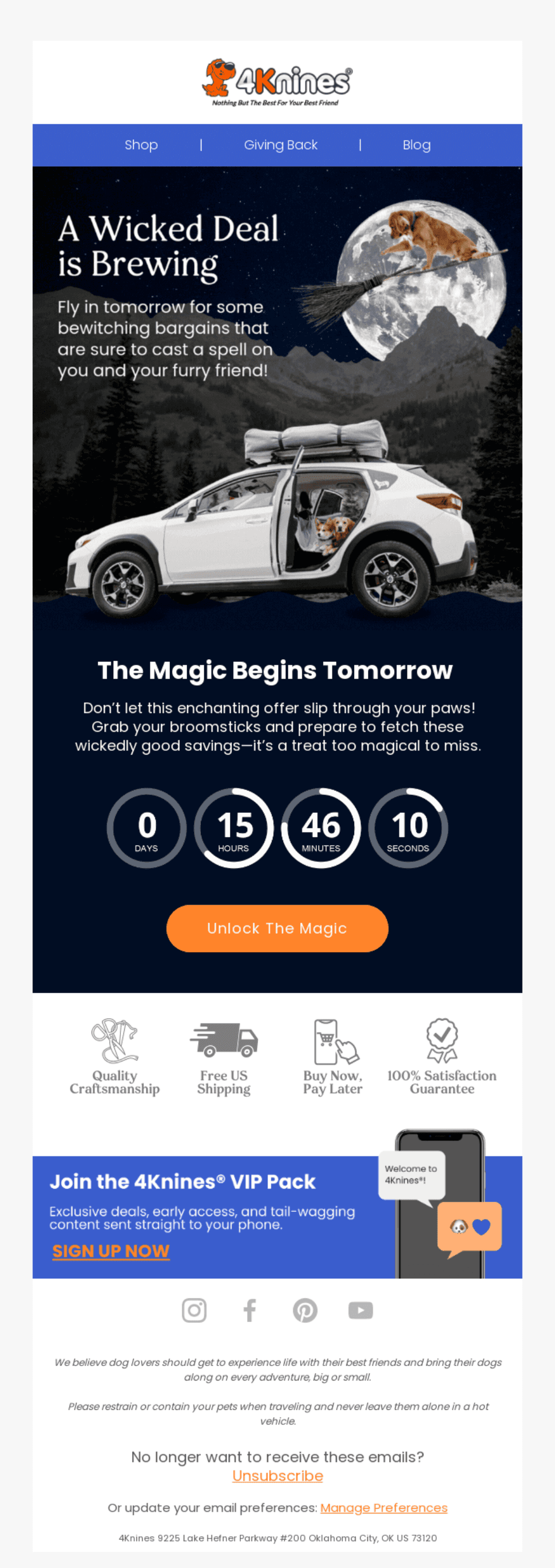
Why It Works:
The Halloween-themed visuals and copy grab attention while the countdown timer creates anticipation for the deal launch. A clear, engaging CTA ensures immediate action.
6. ReMarkable
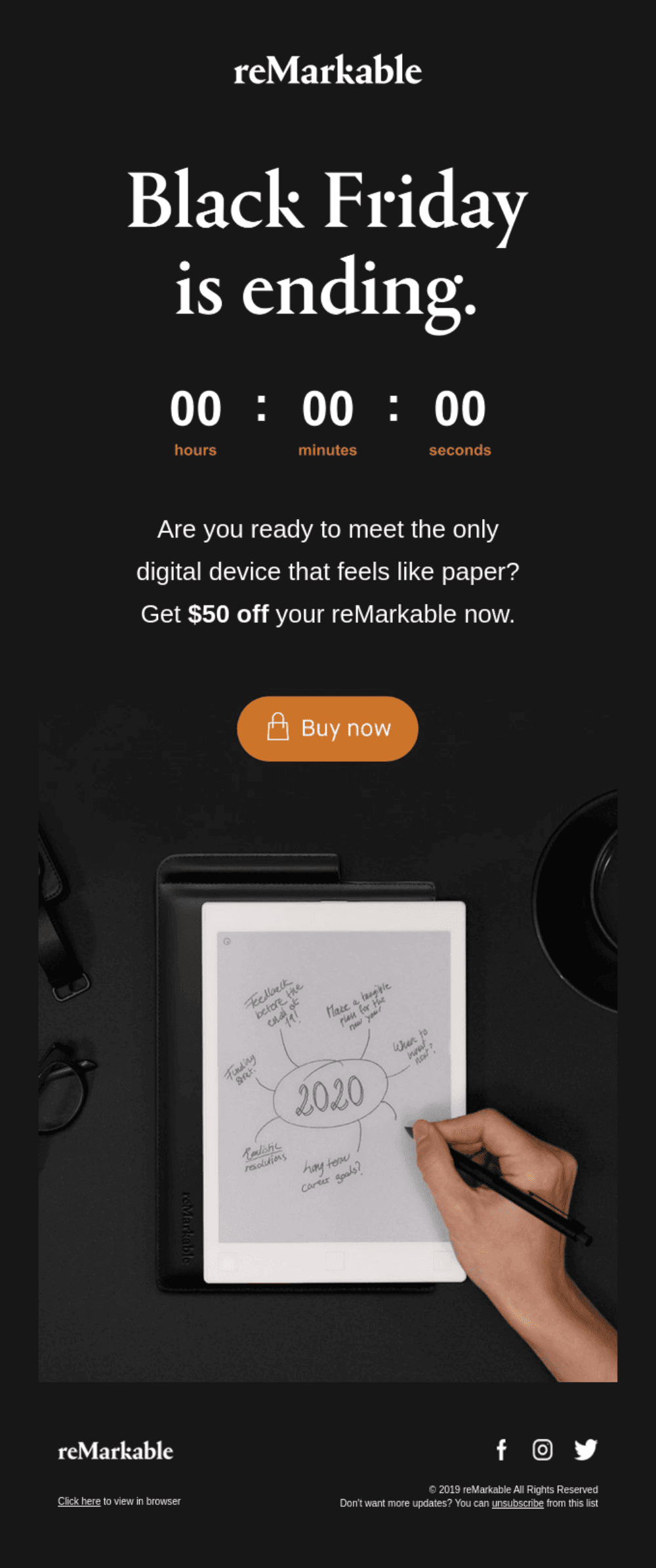
Why It Works:
The minimalist design and clear "$50 off" offer ensure focus on the deal. The countdown timer reinforces the urgency to purchase before the sale ends.
7. Harry's
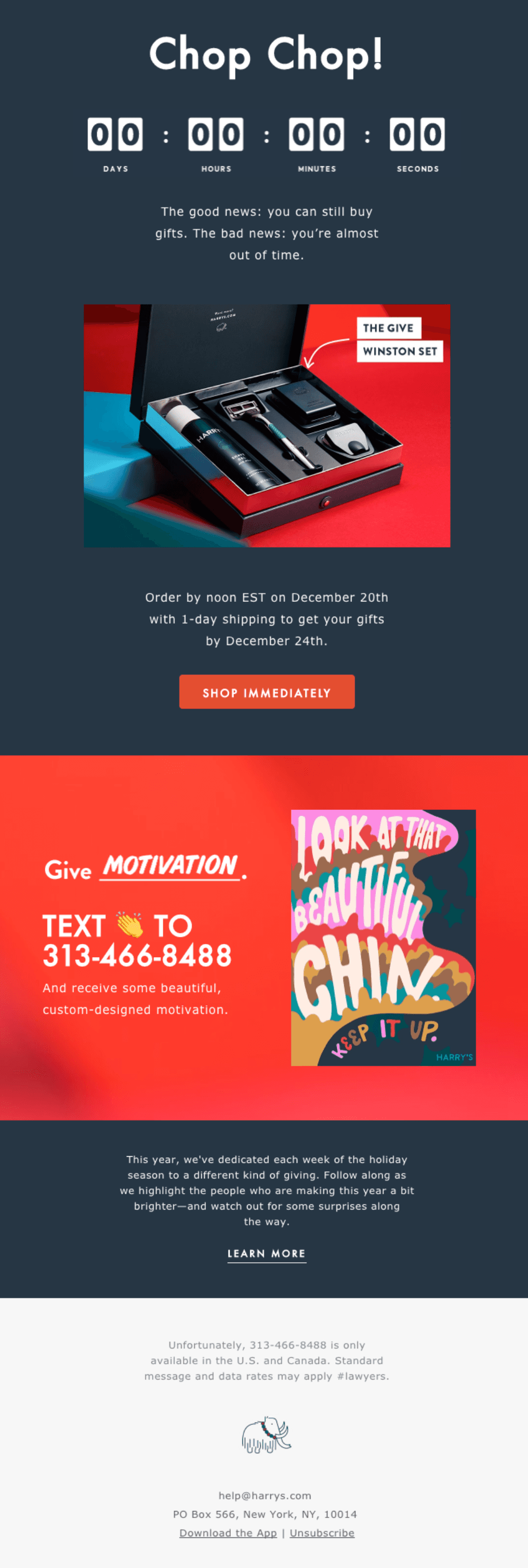
Why It Works:
Playful messaging and the countdown timer push last-minute holiday shoppers to act quickly. Featuring gift sets aligns with the urgency of the holiday shopping season.
8. Casper
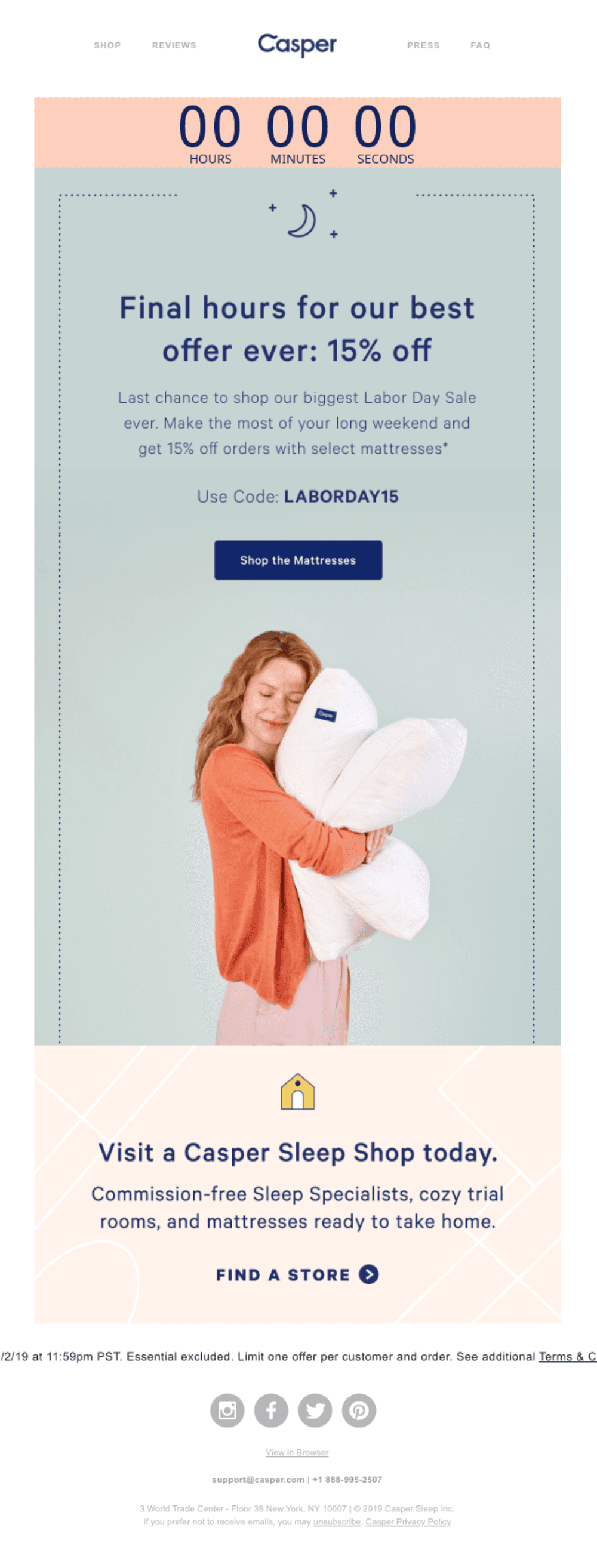
Why It Works:
The countdown timer emphasises urgency, while the 15% discount is simple and clear. The email builds trust with a reference to the brand’s reputation and in-store visits.
9. Buoy

Why It Works:
The countdown timer effectively creates urgency by emphasizing the limited duration of the sale, while the clear "Last chance to save" messaging reinforces FOMO.
10. Counter Culture Coffee
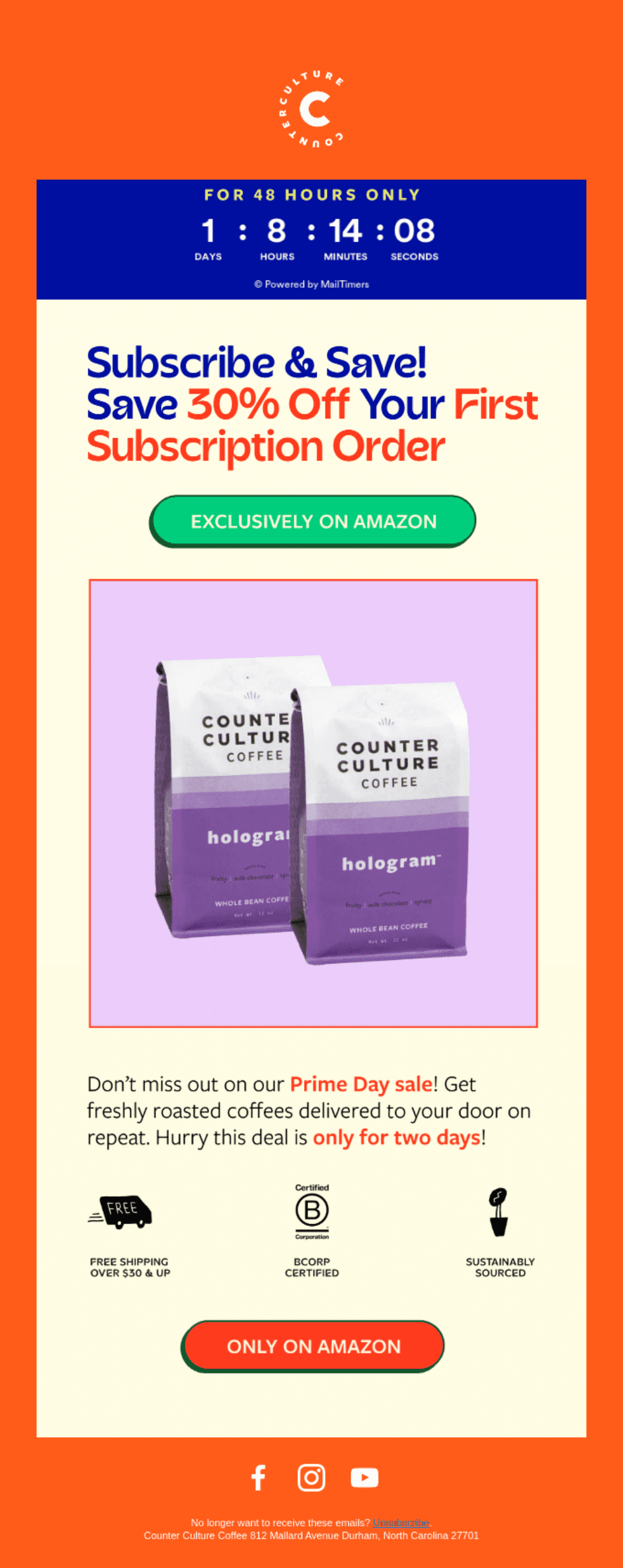
Why It Works:
The exclusive 48-hour discount creates urgency, while bold visuals and bright colours catch the reader’s eye. The Amazon mention adds convenience and trustworthiness.
Source (All Examples): Really Good Emails
Section 6: Best Practices for Using Countdown Timers
To maximise the effectiveness of countdown timers in your email campaigns, it’s crucial to implement them strategically. By following these best practices, you can ensure your timers grab attention, create urgency, and drive conversions.
Placement Tips
Above the Fold: Placing the countdown timer above the fold ensures that recipients see it as soon as they open the email. This placement makes the urgency immediately apparent and sets the tone for the rest of the email.
Near the CTA: Positioning the countdown timer close to the call-to-action (CTA) reinforces the urgency associated with the action you want recipients to take.
Design Tips
Contrast and Readability: Use bold, contrasting colours to make the timer stand out against the email background. Choose a font style and size that are clear and easy to read at a glance. Avoid overly decorative fonts that could compromise readability.
Mobile Optimisation: With a significant percentage of email opens occurring on mobile devices, ensure your countdown timer displays correctly across all screen sizes. Use responsive designs that adapt to different devices without losing clarity or functionality.
Section 7: How Seasonality Affects Countdown Timer Campaigns
Seasonal Campaigns and Countdown Timers
High-Conversion Holidays: Black Friday, Christmas, Valentine’s Day.
Major holidays are peak times for shopping, and countdown timers play a critical role in motivating customers to act quickly. These events often involve limited-time deals, creating a natural urgency that countdown timers can visually enhance.
Why They Work: During high-conversion holidays, competition for attention is fierce. Countdown timers help your email stand out by visually emphasising the urgency of the offer.
Pro Tip: Combine countdown timers with holiday-themed email designs to enhance their impact. A festive colour palette or seasonal imagery can make the email feel more relevant and engaging.
Off-Season Engagement: Summer clearance, back-to-school promotions.
While off-season campaigns don’t generate the same level of excitement as major holidays, countdown timers can still drive results by creating a sense of exclusivity and urgency for limited-time deals.
Why They Work: Off-season promotions often target specific customer needs, such as summer clearance sales or back-to-school shopping. Countdown timers add urgency, encouraging recipients to act before the deals disappear.
Pro Tip: Personalise off-season campaigns by targeting specific customer segments. For example, offer early-bird discounts to loyal customers and highlight them with a countdown timer.
Conclusion
Countdown timers are a game-changer for email marketing, offering a simple yet powerful way to create urgency, boost engagement, and drive conversions. Whether you're running a flash sale, launching a product, or reminding customers of an event, timers tap into the psychological triggers of urgency and FOMO, encouraging recipients to act immediately.
Countdown timers for email are a must-have for boosting engagement and conversions. If you’ve struggled with low engagement rates, delayed customer actions, or missed opportunities in time-sensitive campaigns, countdown timers can be your solution. By visually reinforcing deadlines and adding dynamic appeal to your emails, you can turn hesitant recipients into eager buyers.
Key Takeaways:
Boost Engagement: Countdown timers grab attention and play on FOMO to encourage action.
Drive Conversions: Adding a visible deadline nudges customers to act quickly, reducing procrastination.
Versatile Use Cases: Perfect for flash sales, product launches, event reminders, and seasonal campaigns.
Psychological Triggers: Leverage urgency and scarcity to motivate faster decisions.
Improved Visual Appeal: Timers make emails dynamic, eye-catching, and memorable.
Strategic Placement Matters: Position timers above the fold or near CTAs for maximum impact.
Mobile Optimisation is Key: Ensure timers are responsive and display correctly on all devices.
Seasonal Success: Timers amplify urgency during holidays and off-season campaigns.
Unsure how to implement countdown timers effectively?
Let us take the guesswork out for you! Click here to schedule a free consultation, and we’ll show you how to integrate countdown timers seamlessly and boost overall engagement in your email marketing efforts.
Countdown timers are a simple yet powerful tool in email marketing. By creating a sense of urgency, they drive engagement and conversions like no other element.
Whether you’re promoting a flash sale, launching a product, or reminding customers of an upcoming event, countdown timers can help you achieve your goals.
This guide will walk you through everything you need to know about countdown timers, from understanding their purpose to implementing them effectively in your campaigns.
Section 1: What Are Countdown Timers for Emails?
Definition and Importance of Countdown Timers
Countdown timers are dynamic visuals embedded in emails that tick down to a specific event or deadline, creating urgency and encouraging immediate action.
Why They Matter:
Create Urgency: Motivate recipients to act before a deadline.
Encourage Quick Action: Nudge users to make purchases or sign up promptly.
Enhance Visual Appeal: Dynamic timers grab attention and add professionalism.
Key Benefits of Using Countdown Timers in Emails:
Boost Engagement: Leverage FOMO to prompt action.
Increase Conversions: Visible deadlines reduce procrastination.
Improve Aesthetics: Make emails more engaging and memorable.
Section 2: Why Do Countdown Timers Work?
The Psychology Behind Countdown Timers
Countdown timers are not just eye-catching elements; they are rooted in proven psychological principles that drive human behaviour. They work by leveraging two powerful concepts: urgency and scarcity. Urgency and Scarcity
Urgency is the pressure to act quickly before a deadline. It stems from the fear of missing out (FOMO) on a great deal or event. When customers see a ticking timer, they feel compelled to act faster, knowing the opportunity won’t last forever.
Scarcity focuses on limited availability, such as exclusive deals or limited stock. Combining this with a countdown timer creates an even greater sense of pressure to act immediately before the chance is gone.
The Power of Visual Cues
Countdown timers grab attention by visually reinforcing deadlines. Unlike static text, a ticking timer stands out and constantly reminds recipients of the time left to act. Since the brain processes visuals faster than text, timers are highly effective at highlighting key messages in an email.
Section 3: Use Cases for Countdown Timers in Email Campaigns
Campaign Types That Benefit from Countdown Timers
Here are some specific campaign types that benefit significantly from the use of countdown timers:
Flash Sales and Limited-Time Discounts
Countdown timers are perfect for creating excitement and urgency during flash sales or limited-time discounts. By emphasizing the short time frame, they compel customers to act quickly before the offer expires.

Event Reminders
For events like webinars, product launches, or special promotions, countdown timers act as a strong motivator to register or participate before it’s too late.

Product Launch Countdowns
Build excitement and anticipation for a new product launch by incorporating countdown timers into your emails. They create buzz and make the launch feel like a major event.

Seasonal Campaigns
Seasonal sales like Black Friday, Cyber Monday, or holiday promotions gain an extra boost with countdown timers. Imagine using them in a Black Friday campaign to emphasize limited-time deals. Enhance your campaign strategy with insights from our BFCM Ultimate Guide.

Source (All Examples): Really Good Emails
Section 4: Step-by-Step Guide to Creating Countdown Timers
Step 1: Choose a Countdown Timer Tool
Selecting the right tool is the first step to creating an effective countdown timer. Here are some recommended tools with their pros and cons to help you make an informed choice:
CountdownMail
A free and user-friendly tool designed for simplicity.
Pros: Quick and easy setup with customisation options for colours and fonts.
Cons: Offers fewer advanced features, such as timezone-specific timers or dynamic updates.

Source: CountdownMail
Sendtric
A straightforward tool for generating timers.
Pros: No signup required, making it ideal for quick, one-time use.
Cons: Limited design options and less flexibility compared to paid tools.

Source: Sendtric
MailTimers
A robust tool designed for businesses that need advanced features.
Pros: Includes advanced options such as timezone adjustments, dynamic updates, and stylish templates.
Cons: Requires a paid subscription to unlock full functionality.

Source: MailTimers
Step 2: Customise Your Timer
Once you’ve chosen a tool, the next step is to customise your countdown timer to align with your brand and campaign goals.
Options to Customise:
Adjust colours, fonts, sizes, and styles to match your brand identity.
Ensure the timer is visually appealing and fits seamlessly into your email design.
Advanced Features to Explore:
Timezone Adjustments: Set timers to adapt to the recipient’s local timezone, ensuring relevance for global audiences.
Real-Time Updates: Ensure the timer dynamically updates to reflect the correct countdown, even when the email is opened multiple times.
Step 3: Generate and Embed the Timer Code
Embedding timers into your email flows is straightforward but even more impactful when paired with advanced email tools. For example, Klaviyo Predictive Analytics can complement timers by targeting high-intent customers.
Klaviyo: Open the email editor, paste the generated HTML code directly into a custom block, and adjust the placement for optimal visibility.

Source: CountdownMail
Mailchimp: Use the HTML block in the email editor to paste the timer code. Drag and drop the block into your desired email section.

Source: Mailtimers
If you're evaluating options, our comprehensive comparison of Klaviyo vs Mailchimp provides valuable insights to help you decide.
Section 5: 10 Examples of Countdown Timers from DTC Brands
1. PrettyLittleThing

Why It Works:
Bold colours and a countdown timer amplify urgency for this flash sale. Highlighting multiple discount categories encourages exploration across products.
2. L'AMARUE

Why It Works:
The countdown timer reinforces urgency, clearly showing the limited time left for the sale, while the "Last Hours" headline grabs attention immediately. The inclusion of an additional incentive (free gift with purchase) further encourages immediate action, and the well-organised categories make navigation and decision-making seamless.
3. Max Mara

Why It Works:
The countdown timer builds anticipation for an exclusive fashion event, creating a sense of urgency and excitement. The clean, minimalist design aligns with the brand's elegance, while the "Add to My Calendar" CTA makes it easy for recipients to engage and not miss the event.
4. Kinfield

Why It Works:
A clear "Ends Tonight!" message drives urgency, while the free mini product adds extra value. The direct CTA and countdown reinforce immediate action.
5. 4Knines

Why It Works:
The Halloween-themed visuals and copy grab attention while the countdown timer creates anticipation for the deal launch. A clear, engaging CTA ensures immediate action.
6. ReMarkable

Why It Works:
The minimalist design and clear "$50 off" offer ensure focus on the deal. The countdown timer reinforces the urgency to purchase before the sale ends.
7. Harry's

Why It Works:
Playful messaging and the countdown timer push last-minute holiday shoppers to act quickly. Featuring gift sets aligns with the urgency of the holiday shopping season.
8. Casper

Why It Works:
The countdown timer emphasises urgency, while the 15% discount is simple and clear. The email builds trust with a reference to the brand’s reputation and in-store visits.
9. Buoy

Why It Works:
The countdown timer effectively creates urgency by emphasizing the limited duration of the sale, while the clear "Last chance to save" messaging reinforces FOMO.
10. Counter Culture Coffee

Why It Works:
The exclusive 48-hour discount creates urgency, while bold visuals and bright colours catch the reader’s eye. The Amazon mention adds convenience and trustworthiness.
Source (All Examples): Really Good Emails
Section 6: Best Practices for Using Countdown Timers
To maximise the effectiveness of countdown timers in your email campaigns, it’s crucial to implement them strategically. By following these best practices, you can ensure your timers grab attention, create urgency, and drive conversions.
Placement Tips
Above the Fold: Placing the countdown timer above the fold ensures that recipients see it as soon as they open the email. This placement makes the urgency immediately apparent and sets the tone for the rest of the email.
Near the CTA: Positioning the countdown timer close to the call-to-action (CTA) reinforces the urgency associated with the action you want recipients to take.
Design Tips
Contrast and Readability: Use bold, contrasting colours to make the timer stand out against the email background. Choose a font style and size that are clear and easy to read at a glance. Avoid overly decorative fonts that could compromise readability.
Mobile Optimisation: With a significant percentage of email opens occurring on mobile devices, ensure your countdown timer displays correctly across all screen sizes. Use responsive designs that adapt to different devices without losing clarity or functionality.
Section 7: How Seasonality Affects Countdown Timer Campaigns
Seasonal Campaigns and Countdown Timers
High-Conversion Holidays: Black Friday, Christmas, Valentine’s Day.
Major holidays are peak times for shopping, and countdown timers play a critical role in motivating customers to act quickly. These events often involve limited-time deals, creating a natural urgency that countdown timers can visually enhance.
Why They Work: During high-conversion holidays, competition for attention is fierce. Countdown timers help your email stand out by visually emphasising the urgency of the offer.
Pro Tip: Combine countdown timers with holiday-themed email designs to enhance their impact. A festive colour palette or seasonal imagery can make the email feel more relevant and engaging.
Off-Season Engagement: Summer clearance, back-to-school promotions.
While off-season campaigns don’t generate the same level of excitement as major holidays, countdown timers can still drive results by creating a sense of exclusivity and urgency for limited-time deals.
Why They Work: Off-season promotions often target specific customer needs, such as summer clearance sales or back-to-school shopping. Countdown timers add urgency, encouraging recipients to act before the deals disappear.
Pro Tip: Personalise off-season campaigns by targeting specific customer segments. For example, offer early-bird discounts to loyal customers and highlight them with a countdown timer.
Conclusion
Countdown timers are a game-changer for email marketing, offering a simple yet powerful way to create urgency, boost engagement, and drive conversions. Whether you're running a flash sale, launching a product, or reminding customers of an event, timers tap into the psychological triggers of urgency and FOMO, encouraging recipients to act immediately.
Countdown timers for email are a must-have for boosting engagement and conversions. If you’ve struggled with low engagement rates, delayed customer actions, or missed opportunities in time-sensitive campaigns, countdown timers can be your solution. By visually reinforcing deadlines and adding dynamic appeal to your emails, you can turn hesitant recipients into eager buyers.
Key Takeaways:
Boost Engagement: Countdown timers grab attention and play on FOMO to encourage action.
Drive Conversions: Adding a visible deadline nudges customers to act quickly, reducing procrastination.
Versatile Use Cases: Perfect for flash sales, product launches, event reminders, and seasonal campaigns.
Psychological Triggers: Leverage urgency and scarcity to motivate faster decisions.
Improved Visual Appeal: Timers make emails dynamic, eye-catching, and memorable.
Strategic Placement Matters: Position timers above the fold or near CTAs for maximum impact.
Mobile Optimisation is Key: Ensure timers are responsive and display correctly on all devices.
Seasonal Success: Timers amplify urgency during holidays and off-season campaigns.
Unsure how to implement countdown timers effectively?
Let us take the guesswork out for you! Click here to schedule a free consultation, and we’ll show you how to integrate countdown timers seamlessly and boost overall engagement in your email marketing efforts.
Learn how countdown timers for email boost engagement and conversions with our ultimate guide. Explore their benefits, use cases, and step-by-step implementation.
Countdown timers are a simple yet powerful tool in email marketing. By creating a sense of urgency, they drive engagement and conversions like no other element.
Whether you’re promoting a flash sale, launching a product, or reminding customers of an upcoming event, countdown timers can help you achieve your goals.
This guide will walk you through everything you need to know about countdown timers, from understanding their purpose to implementing them effectively in your campaigns.
Section 1: What Are Countdown Timers for Emails?
Definition and Importance of Countdown Timers
Countdown timers are dynamic visuals embedded in emails that tick down to a specific event or deadline, creating urgency and encouraging immediate action.
Why They Matter:
Create Urgency: Motivate recipients to act before a deadline.
Encourage Quick Action: Nudge users to make purchases or sign up promptly.
Enhance Visual Appeal: Dynamic timers grab attention and add professionalism.
Key Benefits of Using Countdown Timers in Emails:
Boost Engagement: Leverage FOMO to prompt action.
Increase Conversions: Visible deadlines reduce procrastination.
Improve Aesthetics: Make emails more engaging and memorable.
Section 2: Why Do Countdown Timers Work?
The Psychology Behind Countdown Timers
Countdown timers are not just eye-catching elements; they are rooted in proven psychological principles that drive human behaviour. They work by leveraging two powerful concepts: urgency and scarcity. Urgency and Scarcity
Urgency is the pressure to act quickly before a deadline. It stems from the fear of missing out (FOMO) on a great deal or event. When customers see a ticking timer, they feel compelled to act faster, knowing the opportunity won’t last forever.
Scarcity focuses on limited availability, such as exclusive deals or limited stock. Combining this with a countdown timer creates an even greater sense of pressure to act immediately before the chance is gone.
The Power of Visual Cues
Countdown timers grab attention by visually reinforcing deadlines. Unlike static text, a ticking timer stands out and constantly reminds recipients of the time left to act. Since the brain processes visuals faster than text, timers are highly effective at highlighting key messages in an email.
Section 3: Use Cases for Countdown Timers in Email Campaigns
Campaign Types That Benefit from Countdown Timers
Here are some specific campaign types that benefit significantly from the use of countdown timers:
Flash Sales and Limited-Time Discounts
Countdown timers are perfect for creating excitement and urgency during flash sales or limited-time discounts. By emphasizing the short time frame, they compel customers to act quickly before the offer expires.

Event Reminders
For events like webinars, product launches, or special promotions, countdown timers act as a strong motivator to register or participate before it’s too late.

Product Launch Countdowns
Build excitement and anticipation for a new product launch by incorporating countdown timers into your emails. They create buzz and make the launch feel like a major event.

Seasonal Campaigns
Seasonal sales like Black Friday, Cyber Monday, or holiday promotions gain an extra boost with countdown timers. Imagine using them in a Black Friday campaign to emphasize limited-time deals. Enhance your campaign strategy with insights from our BFCM Ultimate Guide.

Source (All Examples): Really Good Emails
Section 4: Step-by-Step Guide to Creating Countdown Timers
Step 1: Choose a Countdown Timer Tool
Selecting the right tool is the first step to creating an effective countdown timer. Here are some recommended tools with their pros and cons to help you make an informed choice:
CountdownMail
A free and user-friendly tool designed for simplicity.
Pros: Quick and easy setup with customisation options for colours and fonts.
Cons: Offers fewer advanced features, such as timezone-specific timers or dynamic updates.

Source: CountdownMail
Sendtric
A straightforward tool for generating timers.
Pros: No signup required, making it ideal for quick, one-time use.
Cons: Limited design options and less flexibility compared to paid tools.

Source: Sendtric
MailTimers
A robust tool designed for businesses that need advanced features.
Pros: Includes advanced options such as timezone adjustments, dynamic updates, and stylish templates.
Cons: Requires a paid subscription to unlock full functionality.

Source: MailTimers
Step 2: Customise Your Timer
Once you’ve chosen a tool, the next step is to customise your countdown timer to align with your brand and campaign goals.
Options to Customise:
Adjust colours, fonts, sizes, and styles to match your brand identity.
Ensure the timer is visually appealing and fits seamlessly into your email design.
Advanced Features to Explore:
Timezone Adjustments: Set timers to adapt to the recipient’s local timezone, ensuring relevance for global audiences.
Real-Time Updates: Ensure the timer dynamically updates to reflect the correct countdown, even when the email is opened multiple times.
Step 3: Generate and Embed the Timer Code
Embedding timers into your email flows is straightforward but even more impactful when paired with advanced email tools. For example, Klaviyo Predictive Analytics can complement timers by targeting high-intent customers.
Klaviyo: Open the email editor, paste the generated HTML code directly into a custom block, and adjust the placement for optimal visibility.

Source: CountdownMail
Mailchimp: Use the HTML block in the email editor to paste the timer code. Drag and drop the block into your desired email section.

Source: Mailtimers
If you're evaluating options, our comprehensive comparison of Klaviyo vs Mailchimp provides valuable insights to help you decide.
Section 5: 10 Examples of Countdown Timers from DTC Brands
1. PrettyLittleThing

Why It Works:
Bold colours and a countdown timer amplify urgency for this flash sale. Highlighting multiple discount categories encourages exploration across products.
2. L'AMARUE

Why It Works:
The countdown timer reinforces urgency, clearly showing the limited time left for the sale, while the "Last Hours" headline grabs attention immediately. The inclusion of an additional incentive (free gift with purchase) further encourages immediate action, and the well-organised categories make navigation and decision-making seamless.
3. Max Mara

Why It Works:
The countdown timer builds anticipation for an exclusive fashion event, creating a sense of urgency and excitement. The clean, minimalist design aligns with the brand's elegance, while the "Add to My Calendar" CTA makes it easy for recipients to engage and not miss the event.
4. Kinfield

Why It Works:
A clear "Ends Tonight!" message drives urgency, while the free mini product adds extra value. The direct CTA and countdown reinforce immediate action.
5. 4Knines

Why It Works:
The Halloween-themed visuals and copy grab attention while the countdown timer creates anticipation for the deal launch. A clear, engaging CTA ensures immediate action.
6. ReMarkable

Why It Works:
The minimalist design and clear "$50 off" offer ensure focus on the deal. The countdown timer reinforces the urgency to purchase before the sale ends.
7. Harry's

Why It Works:
Playful messaging and the countdown timer push last-minute holiday shoppers to act quickly. Featuring gift sets aligns with the urgency of the holiday shopping season.
8. Casper

Why It Works:
The countdown timer emphasises urgency, while the 15% discount is simple and clear. The email builds trust with a reference to the brand’s reputation and in-store visits.
9. Buoy

Why It Works:
The countdown timer effectively creates urgency by emphasizing the limited duration of the sale, while the clear "Last chance to save" messaging reinforces FOMO.
10. Counter Culture Coffee

Why It Works:
The exclusive 48-hour discount creates urgency, while bold visuals and bright colours catch the reader’s eye. The Amazon mention adds convenience and trustworthiness.
Source (All Examples): Really Good Emails
Section 6: Best Practices for Using Countdown Timers
To maximise the effectiveness of countdown timers in your email campaigns, it’s crucial to implement them strategically. By following these best practices, you can ensure your timers grab attention, create urgency, and drive conversions.
Placement Tips
Above the Fold: Placing the countdown timer above the fold ensures that recipients see it as soon as they open the email. This placement makes the urgency immediately apparent and sets the tone for the rest of the email.
Near the CTA: Positioning the countdown timer close to the call-to-action (CTA) reinforces the urgency associated with the action you want recipients to take.
Design Tips
Contrast and Readability: Use bold, contrasting colours to make the timer stand out against the email background. Choose a font style and size that are clear and easy to read at a glance. Avoid overly decorative fonts that could compromise readability.
Mobile Optimisation: With a significant percentage of email opens occurring on mobile devices, ensure your countdown timer displays correctly across all screen sizes. Use responsive designs that adapt to different devices without losing clarity or functionality.
Section 7: How Seasonality Affects Countdown Timer Campaigns
Seasonal Campaigns and Countdown Timers
High-Conversion Holidays: Black Friday, Christmas, Valentine’s Day.
Major holidays are peak times for shopping, and countdown timers play a critical role in motivating customers to act quickly. These events often involve limited-time deals, creating a natural urgency that countdown timers can visually enhance.
Why They Work: During high-conversion holidays, competition for attention is fierce. Countdown timers help your email stand out by visually emphasising the urgency of the offer.
Pro Tip: Combine countdown timers with holiday-themed email designs to enhance their impact. A festive colour palette or seasonal imagery can make the email feel more relevant and engaging.
Off-Season Engagement: Summer clearance, back-to-school promotions.
While off-season campaigns don’t generate the same level of excitement as major holidays, countdown timers can still drive results by creating a sense of exclusivity and urgency for limited-time deals.
Why They Work: Off-season promotions often target specific customer needs, such as summer clearance sales or back-to-school shopping. Countdown timers add urgency, encouraging recipients to act before the deals disappear.
Pro Tip: Personalise off-season campaigns by targeting specific customer segments. For example, offer early-bird discounts to loyal customers and highlight them with a countdown timer.
Conclusion
Countdown timers are a game-changer for email marketing, offering a simple yet powerful way to create urgency, boost engagement, and drive conversions. Whether you're running a flash sale, launching a product, or reminding customers of an event, timers tap into the psychological triggers of urgency and FOMO, encouraging recipients to act immediately.
Countdown timers for email are a must-have for boosting engagement and conversions. If you’ve struggled with low engagement rates, delayed customer actions, or missed opportunities in time-sensitive campaigns, countdown timers can be your solution. By visually reinforcing deadlines and adding dynamic appeal to your emails, you can turn hesitant recipients into eager buyers.
Key Takeaways:
Boost Engagement: Countdown timers grab attention and play on FOMO to encourage action.
Drive Conversions: Adding a visible deadline nudges customers to act quickly, reducing procrastination.
Versatile Use Cases: Perfect for flash sales, product launches, event reminders, and seasonal campaigns.
Psychological Triggers: Leverage urgency and scarcity to motivate faster decisions.
Improved Visual Appeal: Timers make emails dynamic, eye-catching, and memorable.
Strategic Placement Matters: Position timers above the fold or near CTAs for maximum impact.
Mobile Optimisation is Key: Ensure timers are responsive and display correctly on all devices.
Seasonal Success: Timers amplify urgency during holidays and off-season campaigns.
Unsure how to implement countdown timers effectively?
Let us take the guesswork out for you! Click here to schedule a free consultation, and we’ll show you how to integrate countdown timers seamlessly and boost overall engagement in your email marketing efforts.
Join our newsletter list
Sign up to get the most recent blog articles in your email every week.
Other Blogs
Other Blogs
Check our other project Blogs with useful insight and information for your businesses
Other Blogs
Other Blogs
Check our other project Blogs with useful insight and information for your businesses
Other Blogs
Other Blogs
Check our other project Blogs with useful insight and information for your businesses


